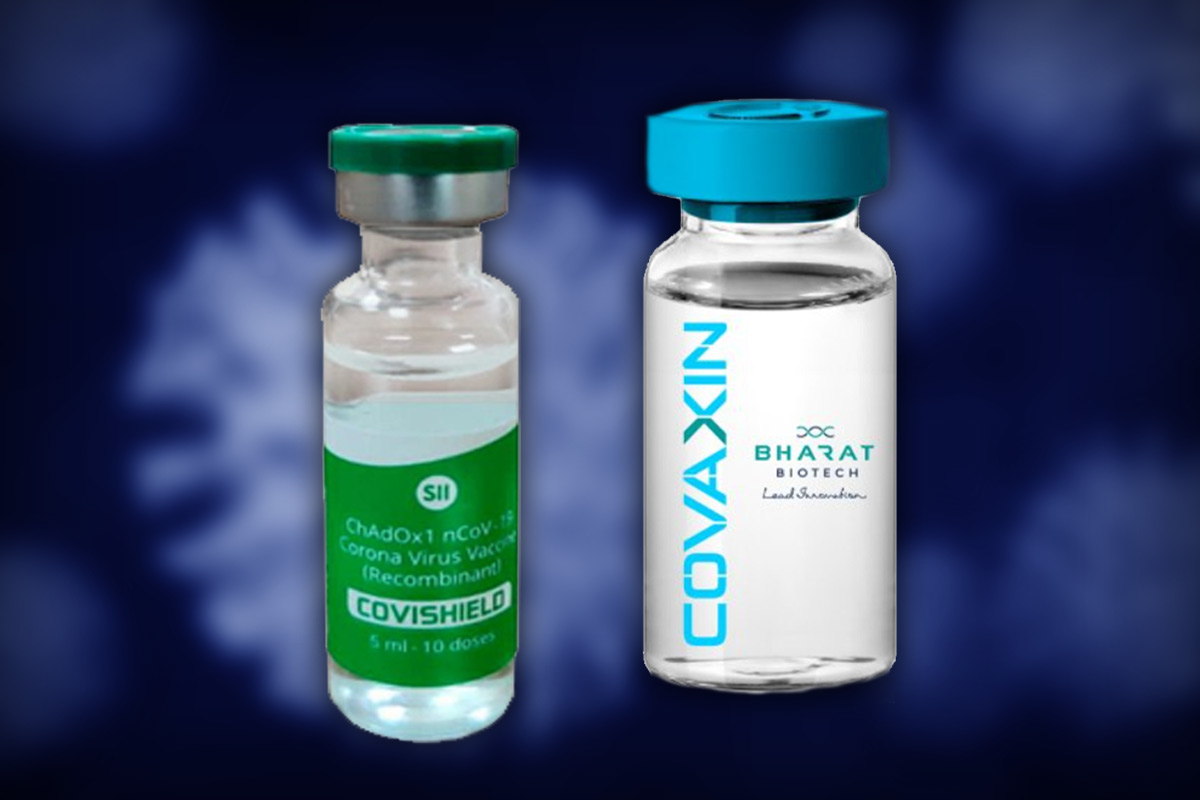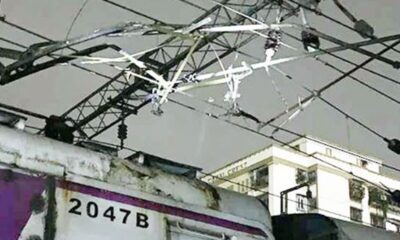Health
List of countries where people vaccinated with Covaxin can travel

Covaxin made by Bharat Biotech is yet to receive clearance from the World Health Organisation, Indians who have taken Covaxin miss out on travelling to countries like the UK, the USA among others. However, despite the delay in approval from WHO, European Union, and the US, there are countries that have recognised it.
Australia: This became the latest country to give its nod to the Indian vaccine. “Covaxin (manufactured by Bharat Biotech, India) and BBIBP-CorV (manufactured by Sinopharm, China) vaccines would be ‘recognised’ for the purpose of establishing a traveller’s vaccination status. This recognition is for travellers aged 12 and over who have been vaccinated with Covaxin, and those 18 to 60 who have been vaccinated with BBIBP-CorV,” a media release from the Australian government said.
Mauritius: Indians who are fully vaccinated with Covaxin can travel to Mauritius, but only after 14 days of the second dose. Travellers should also have a negative Covid-19 RT-PCR test result obtained 3-7 days before departing from India.
Oman: Indians who have taken Covaxin won’t be required to serve the 14-day quarantine anymore. The country has also approved Covaxin. According to the Indian embassy in Oman, “All passengers from India who have received two doses of Covaxin at least 14 days before the estimated arrival date will now be able to travel to Oman without the requirement of quarantine.” Previously, Indian travellers who had taken Covishield were only permitted to travel without quarantine to Oman.
Philippines: Travellers who are planning to go to the Philippines need to be vaccinated at least after 14 days of taking the single or double shot of the Covaxin.
Nepal: The rules to travel to Nepal for Covaxin beneficiaries are also the same as the Philippines. Indian citizens need to show the Covid-19 vaccine certificate and the last dose of the vaccine must have been taken at least 14 days before entering the country.
Mexico: Cofepris, the country’s health regulator, has authorised the emergency use of Covaxin. In case, citizens show symptoms of coronavirus infection then they will undergo quarantine.
Iran: This is another country where Indians who have been inoculated with Covaxin can visit. The person needs to undergo quarantine for 14 days if RT-PCR test reports are not with them.
Sri Lanka: India’s neighbour accepts both Covaxin and Covishield. However, unvaccinated travellers will have to undergo a 14-day quarantine.
Greece: Indians arriving in Greece need to show a Covid-19 vaccine certificate, a negative RT-PCR report of less than 72 hours, or a negative antigen test less than 48 hours old. People do not need to quarantine unless Covid symptoms are observed on arrival.
Estonia: Indian citizens who have taken Covaxin will be allowed to skip the testing and quarantine mandates. It was one of the first countries to recognise Covaxin.
Zimbabwe: Indian travellers need to show negative proof of valid RT-PCR test results. Besides, both Covishield and Covaxin are approved by the African nation.
Health
Expert Advice On COVID Vaccination For Children

Mansukh Mandaviya, the Union Health Minister, announced on Saturday that the central government will begin administering COVID-19 immunisation to children aged 5 to 15 years as soon as a group of specialists makes recommendations to that effect.
When asked about the government’s immunisation policy for youngsters aged 5 to 15, Mandaviya addressed reporters in this city.
He stated that the expert panel has yet to make a recommendation about this category’s vaccination.
The minister was in town for a BJP-hosted event on the Union Budget, which was announced on February 1.
“A panel of scientists recommends when and how to vaccinate, as well as which age groups to vaccinate. Within one week, we had implemented the precaution group’s advice. We will undoubtedly put its advice (for the age group of 5 to 15) into action as soon as we receive it “During a press conference, he stated.
COVID-19 immunisation for children aged 15 to 18 years old began last month across the country.
“Vaccination is no longer a concern. There is no shortage of vaccines; there are no shortages of dosages. We will unquestionably accept the scientific community’s advice “Mandaviya threw in her two cents.
The ministry has yet to receive such a suggestion and will make a decision in the following days based on that information. It isn’t a decision based on politics. In July-August of last year, he noted, a serosurvey and seroprevalence study revealed that 67% of youngsters developed antibodies while remaining asymptomatic.
“In the end, it’s all about biology. As a result, before making recommendations, scientists do research. We used to watch the news all the time (for recommendations regarding vaccination). Our scientists today perform their research, conduct their studies, and form their conclusions “He expressed himself.
He further said that during the third wave of the pandemic, India employed immunisation to combat it quite efficiently.
The minister stated that large-scale immunisation helped India combat the third wave, as evidenced by leading institutes around the world and the Indian Council of Medical Research (ICMR).
According to him, 75% of children (15-18 years old) have had their COVID-19 immunisation shots, 96% of adults have received the first dose, and 77% have received both doses.
“Based on all of this, I can certainly say that India has been able to use vaccination very effectively to fight against the COVID-19 crisis,” he said, adding that the ICMR studies showed that COVID-19 vaccination has helped the majority of people, and as a result, the country is moving toward the flattening of the curve.
He claimed that the government’s focus on vaccination during the 2020 shutdown, which began shortly after the virus’s emergence, helped India maintain its economic economy and avoid the high inflation and negative growth witnessed in the United States and Europe.
According to Mandaviya, vaccination research was prioritised by the government, and the government provided funding for it. By January 16 of last year, India’s indigenously manufactured vaccine had been launched at the same time as vaccines created in other countries.
“India made immunisation available to the rest of the globe and even began mass-producing it. As a result, when the third wave (of the COVID-19 pandemic) arrived, we were already ahead of the game in terms of immunisation. Because India had completed 96 per cent of the first dose, we were spared in the third wave “He expressed himself.
Mandaviya, speaking about the Union Budget, said that India would enter a golden period.
“I am confident that its implementation will accelerate comprehensive and time-bound development in the correct direction,” he said.
Health
Chinese scientists inform about yet another type of Coronavirus

According to a new study by Chinese researchers, a new type of coronavirus named NeoCov, that spreads among bats may pose a threat to humans in the future if it mutates further.
The study that was recently posted on the preprint repository BioRxiv shows that NeoCov is closely related to the Middle East respiratory syndrome (MERS), a viral disease first identified in Saudi Arabia in 2012.

Coronaviruses are a large family of viruses that can cause diseases ranging from the common cold to Severe Acute Respiratory Syndrome (SARS).
Researchers from the Chinese Academy of Sciences and Wuhan University noted that NeoCov is found in a population of bats and to date spreads exclusively among these animals.
In its current form, NeoCov does not infect humans but further mutations may make it potentially harmful for human life. The researchers further noted that infection with NeoCov could not be cross-neutralised by antibodies targeting the existing variants of coronavirus.
Health
Covid vaccines like Covaxin, Covishield to be available in hospitals

Covaxin and Covishield will now be available in the regular market as the Drug Controller General of India have given conditional market approval to these two Covid vaccines on Thursday.
The subject expert committee of the Central Drug Standard Control Organisation has earlier recommended granting regular market approval to these Covid-19 vaccines for the adult population, subject to certain conditions. Market approval, however, does not mean that the vaccines will be available in medical shops. People will have to buy Covishield and Covaxin from hospitals and clinics.
Vaccination data has to be submitted to DCGI every six months. Data will have t to be updated on CoWIN app also. Earlier, it was reported that the Centre was planning to cap the price of the vaccines at ₹275 per dose.
The approval has been granted under the New Drugs and Clinical Trials Rules, 2019. The firms, in this case, Bharat Biotech (Covaxin) and Serum Institute of India (Covishield), shall submit data of ongoing clinical trials
All vaccination data will be recorded on the CoWIN platform. The approval is only for adult population.
-

 Fact Check5 years ago
Fact Check5 years agoNidhi Razdan, fake Harvard professorship, and here is the explanation through her blog.
-

 India4 years ago
India4 years agoAs the arrangement with Prashant Kishor falls through Rahul Gandhi has gone overseas again and is uncontactable
-

 Technology4 years ago
Technology4 years agoBSNL reveals all new 4G plans starting at ₹16
-

 Latest News5 years ago
Latest News5 years agoGovernment has spent ₹9,725 crores on Covid-19 vaccination drive so far
-

 Latest News4 years ago
Latest News4 years agoTata wins Air India with ₹18,000 crore bid
-

 Latest News4 years ago
Latest News4 years agoJharkhand government cuts Petrol price by massive ₹25 a litre but with a catch
-

 Latest News5 years ago
Latest News5 years agoRaj Kundra Gave ₹25 Lakh Bribe to Mumbai Crime Branch to Avoid Arrest
-

 Navi Mumbai5 years ago
Navi Mumbai5 years agoNavi Mumbai civic body raids and tests morning walkers, many found COVID positive














